Stadion Miejski (Wrocław)
The Municipal Stadium in Wrocław, Poland, (Polish: Stadion Miejski we Wrocławiu, also Stadion Wrocław) is a UEFA Category Four association football stadium built for the 2012 UEFA European Football Championship. The Stadium is located on aleja Śląska in the western district of Pilczyce. It is the home stadium of the Śląsk Wrocław football team playing in the Polish Ekstraklasa. The stadium has a capacity of 45,105[4] spectators, all seated and all covered.[5]
Stadion Miejski we Wrocławiu | |
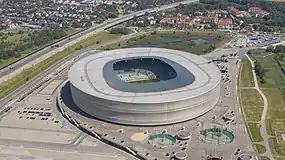 | |
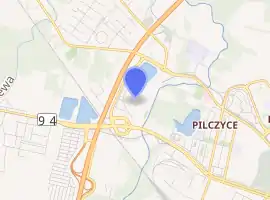
| |
| Full name | Municipal Stadium in Wrocław |
|---|---|
| Location | Aleja Śląska 1 54-128 Wrocław, Poland |
| Coordinates | 51°08′28.2″N 16°56′37.6″E |
| Owner | City of Wrocław |
| Operator | SMG |
| Capacity | 45,105[1] |
| Record attendance | 42,771[2] Śląsk 1–0 Lechia (28 October 2011) |
| Field size | 105 x 68 meters |
| Surface | Grass[3] |
| Construction | |
| Broke ground | 2009 |
| Built | 2009–2011 |
| Opened | September 10, 2011 |
| Construction cost | 729,7 mln PLN |
| Architect | JSK Architekci |
| Tenants | |
| Śląsk Wrocław | |
| Website | |
| Official Website | |
The Municipal Stadium in Wroclaw is the largest arena in Ekstraklasa and the third largest in the country (after National Stadium and Silesia Stadium).
Stadium construction began in April 2009 and was completed in September 2011.[6]
Stadium opening took place at 10 September 2011 with boxing fight between Tomasz Adamek and Vitali Klitschko for WBC heavyweight title . The first football match, between Śląsk Wrocław and Lechia Gdańsk, was played on 28 October 2011. Śląsk won the match 1:0 and Johan Voskamp was the first goalscorer at the new stadium.[7]
Stadium Concept
Overall, esplanade & roof
The winning architectural concept developed by JSK Architekci is called STADIUM-LANTERN. The distinctive shape was chosen to be easily recognizable and associated with a dynamic city.[8]
The shape of the stadium is highlighted by the innovative design of its external walls. The building is covered by glass fibre mesh coated with teflon. The mesh is anchored by steel rings placed around the entire body of the stadium. The covering lends lightness and transparency to the massive structure. The colors of the external walls of the stadium can be changed using a sophisticated lighting system.[9]
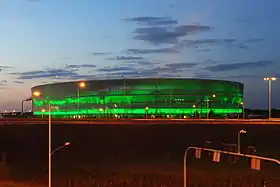
The architectural concept also includes an outdoor promenade around the stadium, called the esplanade with a total area of 52 753 m². The esplanade grants access to the inside of the stadium from two directions. From the south, it leads under Lotnicza Street where an integrated Park&Ride plaza is being built with a tram stop, a train station, and an outdoor parking lot). From the north, the esplanade leads from the northern public transport interchange with tram and bus stops and a parking lot for buses.[10]
The area surrounding the stadium and esplanade is landscaped and provided with benches to create a park-like space where people can relax or meet. The platform rises from the ground level at the first level of the stadium promenade, which is located at 5.44 m. Entrance to all stadium’s sections are located exactly on this level. The height of the stadium is 39.33 meters measured from ground level to the upper edge of the roof structure. Construction of the stadium consists of four buildings that are connected by two promenades (at the first and fourth level). All stands on the stadium are one-level with 56 rows. Four-level parking area for cars is located near the stadium.[10]
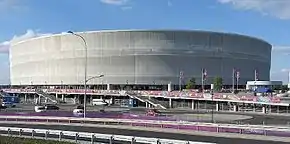
Functions and characteristics
The stadium is divided into a number of dedicated zones necessary for the proper functioning of a sport arena. VIP guests is allowed to under the rim of the stadium so that they can quickly reach the spacious VIP zone entry hall on Level 0 in the western section of the stadium. VIP fans is seated in close proximity to the playing field, and is separated from the teams' zone only by a glass wall.[11]
On Level 3, there are twenty multifunction and glassed VIP boxes with a clear view of the pitch. Ten VIP boxes in the eastern stand is available for rental under the name "Incentive Boxes".[12] Each of them has its own access to a terrace platform with a width of about 2.5 m. Depending on the type of boxes, their capacity varies form 13 to 26 people, also they can be combined. Both standard VIP boxes and Incentive boxes have its own dedicated VIP seats located, in the immediate vicinity of the terraces.
.jpg.webp)
VIP seats is broken down into three sectors: gold, silver, and bronze, depending on their location and the view they offer.[13]
The esplanade surrounding the entire stadium leads from the ground level to Level 1. Concession stands, first aid stations, police offices and rest rooms are located on the promenade. Seats for fans with disabilities are located in stands equipped with wheelchair ramps, and disabled fans are able to sit next to their caretakers. There are 102 such seats on the stadium plus another 102 seats for caretakers. The stadium bars and restaurants are equipped with special-designated, lower countertops, make it easier for disabled people in wheelchairs to eating a meal. There are also 50 places for people who have vision problems. For the hearing impaired people a professional collector headphones to listening a match commentary are prepared. The new stadium is an arena without barriers.[14]
The teams' zone is located on Level 0 in the western part of the stadium. Identical facilities for both teams are equipped with locker rooms, massage rooms, showers, toilets, coach rooms and warm-up areas. The media zone is located in the upper section of the western stand. Each seat meets FIFA/UEFA requirements and is equipped with power, telephone, internet and TV connections. Some seats have a foldable desktop. Seats for commentators have revolving chairs. Section for visitor supporters is located in the south east stadium corner, marked as “Sektor X” and has a capacity of 3439 seats.[15]
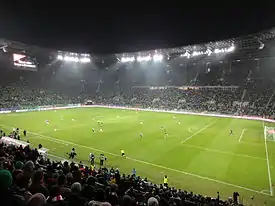
The roof of the stadium is partially glassed for provide increased natural lighting on the pitch. South side of the roof has a more glassed area than the north one. Under the roof there are two LED display screens. Each has dimension of 12,8 x 7,68 m. They were made by Mitsubishi Electric Corporation.[16]
All types of seats installed on the stadium are produced and provided by Polish brand Forum Seating owned by Nowy Styl Group located in Krosno.[17]
Naming rights
In official documents, the stadium is known as Municipal Stadium. It is likely that the arena will get a commercial sponsor in the near future, which will be chosen by the operator of the stadium. The operator of the stadium is a company named Wrocław 2012 owned by the city itself.[18]
Location
Stadium is located in Wrocław, in the Fabryczna district administratively belonging to the Pilczyce Osiedle.[19]
Transport
National road 94 runs just south of the stadium. A new motorway bypass A8 was built as part of the infrastructure for the stadium.[20]
Currently, the stadium can be reached by different kinds of public transport. By buses: 103, 403, 435 and tram 31PLUS from the north side, and by the trams 3, 10, 20, 33PLUS, and bus 128 from the south side.[21]
On the south side of the stadium, a transport interchange is situated, including a new train station called Wroclaw Stadion. A two-way railway line run at the zero level, while at the first level a tram line is prepared to connect the city center with Leśnica. The transport interchange is also available for vehicular traffic. A car park, city bus stop, bicycle paths and parking for cyclists are located there. A heliport is located on the eastern side of the stadium.[22]
Poland national football team matches
The Polish national football team plays often in this stadium. The inauguration match was played against Italy on 11 November 2011. The most recent friendly match was played with Ireland on 11 September 2018.
| Nr | Competition | Date | Opponent | Result | Attendance | Scorers for Poland |
|---|---|---|---|---|---|---|
| 1 | Friendly | 11 November 2011 | 0–2 | 42,000 | ––– | |
| 2 | UEFA Euro 2012 | 16 June 2012 | 0–1 | 41,480 | ––– | |
| 3 | 2014 FIFA World Cup qualification | 11 September 2012 | 2–0 | 26,145 | Jakub Błaszczykowski, Jakub Wawrzyniak | |
| 4 | Friendly | 15 November 2013 | 0–2 | 40,605 | ––– | |
| 5 | Friendly | 18 November 2014 | 2–2 | 40,133 | Artur Jędrzejczyk, Arkadiusz Milik | |
| 6 | Friendly | 17 November 2015 | 3–1 | 40,793 | Arkadiusz Milik, Tomasz Jodłowiec, Kamil Grosicki | |
| 7 | Friendly | 26 March 2016 | 5–0 | 42,068 | 2 x Kamil Grosicki, 2 x Paweł Wszołek, Filip Starzyński | |
| 8 | Friendly | 14 November 2016 | 1–1 | 40,140 | Łukasz Teodorczyk | |
| 9 | Friendly | 23 March 2018 | 0–1 | 41,208 | ––– | |
| 10 | Friendly | 11 September 2018 | 1–1 | 25,455 | Mateusz Klich | |
| 11 | 2020-21 UEFA Nations League | 14 October 2020 | 3-0 | 2 x Robert Lewandowski, Karol Linetty | ||
Euro 2012 matches
The stadium was used as one of the venues for the UEFA Euro 2012. Three group A matches were played there (with the other matches in that group played at National Stadium, Warsaw).
The following matches were played there during the tournament:
| Date | Time (CEST) | Team #1 | Result | Team #2 | Round | Scorer(s) |
|---|---|---|---|---|---|---|
| 8 June 2012 | 20:45 | 1–4 | Group A | Václav Pilař Alan Dzagoev (2) Roman Shirokov Roman Pavlyuchenko | ||
| 12 June 2012 | 18.00 | 2–1 | Group A | Petr Jiráček Václav Pilař Theofanis Gekas | ||
| 16 June 2012 | 20.45 | 0–1 | Group A | Petr Jiráček | ||
See also
- Wrocław-Copernicus Airport
- Motorway A8 linked with stadium
- List of football stadiums in Poland
References
- https://stadionwroclaw.pl/stadion/fakty-i-liczby/
- "Śląsk - Lechia: udane otwarcie nowego stadionu, lider zostaje we Wrocławiu". eurosport.onet.pl. Retrieved 28 October 2011.
- "WKS Ślask Wrocław: Stadion Miejski". Soccerway. Perform. Retrieved 17 December 2015.
- https://stadionwroclaw.pl/stadion/fakty-i-liczby/
- WROCŁAW 2012 - NOWY STADION WE WROCŁAWIU
- "Stadion Miejski we Wrocławiu". stadiony.net. stadiony.net. Retrieved 2011-12-04.
- "Udane otwarcie stadionu Śląska". qmichal. 90minut.pl. Retrieved 2011-12-04.
- "Tak będzie wyglądał wrocławski stadion na Euro 2012". Artur Brzozowski. wroclaw.gazeta.pl. Archived from the original on 2012-07-18. Retrieved 2012-05-20.
- "Stadion na Euro we Wrocławiu jak chiński lampion". Artur Brzozowski. wroclaw.gazeta.pl. Retrieved 2012-05-27.
- "Stadion Miejski Wrocław". 2012-me.pl. Retrieved 2012-05-20.
- "Stadion Wrocław - Loże". www.stadionwroclaw.pl. Archived from the original on 2012-06-11. Retrieved 2012-05-27.
- "Stadion Miejski we Wrocławiu – arena Euro 2012". architeon.pl. Retrieved 2012-05-27.
- "Rusza sprzedaż miejsc VIP na stadionie we Wrocławiu". gazetaprawna.pl. Retrieved 2012-05-27.
- "Wrocławski stadion czeka także na niepełnosprawnych". Baj. wroclaw.gazeta.p. Archived from the original on 2012-07-05. Retrieved 2012-05-27.
- "Debiut Śląska na nowy stadionie tuż, tuż". wroclove2012.com. Archived from the original on 2012-01-02. Retrieved 2012-05-27.
- "Mitsubishi Electric installs large led screen in Poland's newest stadium". Paul Milligan. avinteractive.com. Retrieved 2012-05-27.
- "Doświadczona firma Nowy Styl dostarczy krzesełka na wrocławski stadion". 2012.wroc.pl. Archived from the original on 2011-10-12. Retrieved 2012-05-27.
- "Wrocław 2012 operatorem stadionu". 2012.wroc.pl. Archived from the original on 2012-07-11. Retrieved 2012-05-27.
- "Wrocław: Nie będzie stadionu na Maślicach, dopóki radni nie zmienią granic osiedli". Marcin Rybak, Marcin Torz. gazetawroclawska.pl. Retrieved 2012-05-27.
- "Stadion Miejski Wrocław / JSK". arch daily. Plataforma Networks. Retrieved 21 January 2013.
- "Bus Time Table". Wroclaw.pl. Retrieved 2012-05-27.
- "Stadion - Lokalizacja". 2012.wroc.pl. Retrieved 2013-03-12.
External links
| Wikimedia Commons has media related to Wrocław Municipal Stadium. |
.jpg.webp)